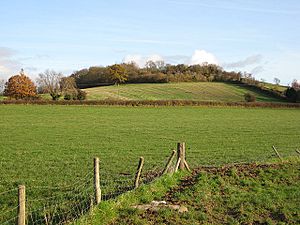Sutton Walls Hill Fort facts for kids
Sutton Walls Hillfort is an ancient fort from the Iron Age. It is shaped like a long oval and is located about four miles north of Hereford, England. This important historical site was added to the official list of "Sites and Monuments" in 1988.
Contents
History of Sutton Walls Hillfort
Sutton Walls Hillfort has a long and interesting history, going back thousands of years. It was first built and used during the Iron Age, a time when people started using iron tools and weapons.
Building the Iron Age Defenses
Around 100 BC, people living at Sutton Walls began to build strong defenses. They dug a V-shaped ditch and built a large bank inside it. To make these defenses even stronger, they reinforced the banks with wood and stone.
This big building project happened because a larger community was starting to live on top of the hillfort. The people lived in huts made of wood and stone, all protected by these new defenses. Around 25 AD, the defenses were made even stronger with a large wooden wall built around the entire settlement.
Roman Attack and Occupation
Archaeological digs have shown that Sutton Walls was attacked around 48 AD. The powerful Romans, led by a general named Ostorius Scapula, attacked the fort. During this attack, 24 of the people living there were killed. Their bodies were found in the ditch around the fort. Looking at the bones, it's clear they died in a fight.
After the Romans took over, they stayed at Sutton Walls until about the 3rd century. During their time there, the Romans made the fort's defenses even stronger. They likely built a bigger and tougher wall to show their control over the area and its people.
King Offa and the Story of Æthelberht
Many people believe that Sutton Walls was also the location of the palace of Offa of Mercia. Offa was a very powerful Anglo-Saxon king.
According to old writings like the Anglo-Saxon Chronicle, something important happened at Sutton Walls in 794. It is said that King Offa arranged for Æthelberht II of East Anglia to be killed here. Medieval stories tell us that Æthelberht was visiting to meet his future bride, Ælfthyth, who was Offa's daughter. He was then captured and killed.
One story, which is hard to prove, says that Offa's queen, Cynethryth, convinced her husband to have Æthelberht killed. Æthelberht was then tied up and executed by a person named Grimbert. After his death, Æthelberht was later recognized as a saint. He became very important to people in East Anglia and at Hereford, where a special shrine for him once existed.
 | Selma Burke |
 | Pauline Powell Burns |
 | Frederick J. Brown |
 | Robert Blackburn |


